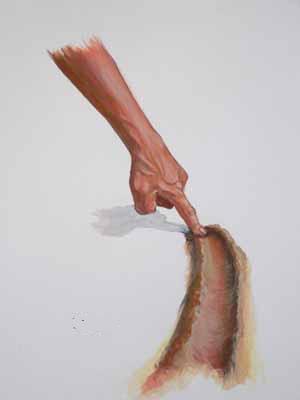
(Source)
Let's Adore Jesus-Eucharist! | Home >> Lost Sermons

(Source)
Fr. Richard Neuhaus has a must-read article in the current First Things titled "The Truce of 2005?" that makes a compelling argument that the Vatican's Instruction on homosexual seminarians will bring onto the pontificate of Benedict XVI what Humanae vitae forced onto that of Paul VI: a defining test.
In both cases, Neuhaus points out, there is widespread institutional dissent to contend with. He says this dissent is characterized by "a quality of dissimulation," of which he finds the Society of Jesus a preeminent, though not unique, example:
There is, for instance, a mix of candor, defiance, and evasion in a December 8 letter sent by the provincial, Father Robert Scullin, S.J., to the members of the Detroit Province of the Society of Jesus. He writes: "The instruction's call to affective maturity as a necessary condition for a healthy celibate priesthood and religious life affirms the long-standing goal of our formation program -- both initial and continuing. All of us must continue to work toward an integrated affective sexual maturity if we wish to be of greater service to the Church and civil society. We continue to invite all qualified young men of either orientation who desire to lead a celibate chaste religious life to consider joining us on our mission. We welcome them and are proud to have them among us."
In short, and the instruction notwithstanding, the Society of Jesus will continue to do what it has been doing. (The reference to "either orientation," with its implicit exclusion of the bisexual and transsexual, is somewhat surprising.) The above provincial is very displeased, however, by a member of the province who "outed" himself as gay in the Detroit Free Press. Father Thomas J. O'Brien, S.J., criticizes the teaching that homosexual attractions are objectively disordered. "There is plentiful evidence that this is not true," he writes. "Lesbian sisters and gay brothers and priests have, indeed, been models of relating to people -- especially to the disenfranchised and excluded of society." Of the instruction he says, "This document reveals a fundamentally disordered view of gender and sexual orientation." Affirming the invaluable contributions made by homosexual, bisexual, transgendered, and transsexual persons, Fr. O'Brien concludes: "Thankfully, God is greater than any religion or any church."
Referring to Fr. O'Brien's public statement, Fr. Scullin, his provincial, writes: "I can appreciate the distress that led him to speak out. Yet we are first members of an apostolic body, and so personal actions, however compelling we feel them to be, have consequences for all our brothers and all our works." Fr. Scullin therefore asks that "no Jesuit take any controversial public step without prior, direct consultation with the provincial." Fr. Scullin in no way suggests that he disagrees with Fr. O'Brien's rejection of church teaching, only that it should be kept within the family, so to speak. As he puts it, "This is our way of proceeding." It is a way of proceeding that candidly says (at least within the family) that the instruction will be ignored, while asking Jesuits to be publicly discreet about their repudiation of the Church's teaching on sexuality.
Bang on target. Yet Neuhaus is too tactful to point out that Fr. O'Brien is in a much stronger position than his superior. For O'Brien can retort with perfect justice to Fr. Scullin, "Excuse me. If prior, direct consultation with responsible ecclesiastics is called for, please show me the permission you received from the Papal Nuncio, or the Prefect of the Congregation for Catholic Education, for your 'welcome to gays' letter. When I'm convinced you're clearing your policy with the Holy See, then I'll believe you're more interested in apostolic obedience than damage control." As Neuhaus says, "There is a smell of mendacity surrounding much of the response to the instruction."
But the problem of dissent, and timidity in the face of dissent, is broader than the Jesuits. Neuhaus writes further, "Among those who greatly admired Cardinal Ratzinger and were elated by his election as pope, there is a palpable uneasiness." He refers specifically to Benedict's appointment of Levada to the CDF and of the less-than-encouraging Niederauer as Archbishop of San Francisco. Will this pope have the stomach to face the tough decisions yet to be made?
In 1968 [i.e.,in the wake of Humanae vitae], an effort was made to hold accountable those who are solemnly vowed to the service of the Church. And then Rome caved. We are still living with the unhappy consequences of the Truce of 1968. Of course the Church will survive. We have Our Lord's promise on that. But no one who cares about this pontificate and the integrity of the Church's ministry can contemplate with equanimity the consequences of a Truce of 2005.
Read it all.
Copyright © 2006 Catholic Culture.
Let's Adore Jesus-Eucharist! | Home >> Lost Sermons